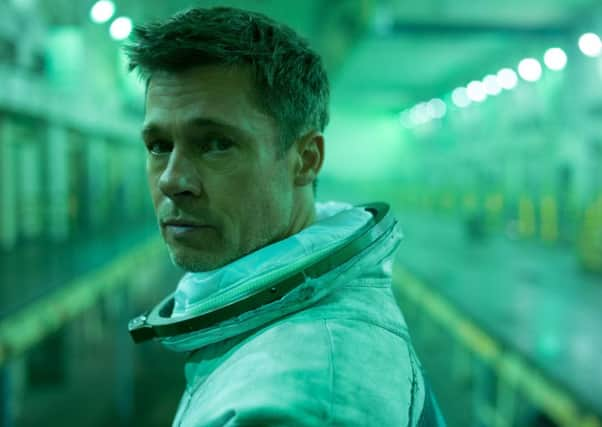Film reviews: Ad Astra | The Farewell


Ad Astra (12A) ***
The Farewell (PG) ****
Given the number of iconic sci-fi movies that have shaped the way we look at outer space, it’s understandably hard to come up with new ways to shoot it. Kudos, then, to James Gray. If nothing else, his Brad Pitt-starring opus, Ad Astra, offers the jaw-dropping sight of a gravity-challenged car chase on the moon. Not that there aren’t other things to marvel at in the film. But as far as breathlessly executed, never-before-seen image-making goes, this is right up there: a dynamic action sequence that perfectly marries spectacle with theme. The film is set, after all, in a near future in which space travel has been commercialised and the moon transformed into a borderless, exploitable territory that’s part family-friendly theme park, part lawless frontier – so why not transpose something we’re used to seeing in Earthbound movies to the surface of the moon and shoot it with the kind of knuckle-gnawing veracity Gray achieved with his rain-lashed tyre-screecher in the underrated crime movie We Own the Night? This ability to mix the familiar with the phenomenal also helps distinguish the film from Damian Chazelle’s recent Neil Armstrong film First Man, which is useful given Pitt’s protagonist, Roy McBride, is nothing if not Armstrongian in his stoic ability to compartmentalise his life, keep his emotions in check and prevent his heart-rate racing out of control. Gray makes the most of the latter character trait to clue us into McBride’s composure under pressure, kicking the film off with another stunner of a scene that shows McBride falling back to Earth from the higher reaches of an atmosphere-traversing space antenna, his emergency parachute punctured en route by debris from an extraterrestrial electrical surge. That surge, it turns out, is threatening the future of the Earth and the corporate overlords running the show think it might have something to do with the Lima Project – a voyage to the outer reaches of the solar system that went off-line 16 years earlier while searching for signs of intelligent life. The Lima Project’s mission commander was McBride’s father, Clifford McBride (Tommy Lee Jones), and though he’s been officially martyred in the years following his disappearance, the powers-that-be are worried that he may actually be alive and deliberately hiding out on the fringes of Neptune, like an intergalactic Colonel Kurtz. As reductive as it sounds, Apocalypse Now in Space isn’t all that inaccurate a description. As Roy is covertly dispatched to Mars in an effort to make contact with his father, his mission follows some of the same contours as Francis Ford Coppola’s Vietnam war odyssey – the colonial themes which Gray himself interrogated with his last movie, The Lost City of Z. There are a few entertaining nods here too, including an unscheduled stop along the way to Mars in which the advice “Never get out of the boat” remains absolutely goddamn right. Alas, there’s also one frustratingly clunky homage that ends up being more Blade Runner than Apocalypse Now: McBride’s intrusive, spell-everything-out voice-over. Time and again moments both visually resplendent and casually wondrous are invaded by Pitt’s voice uttering banal observations on what we’re watching on screen. The effect undercuts Gray’s careful compositions and Pitt’s otherwise nuanced and internalised performance. In a film about the search for intelligent life, it feels like a failure of nerve that, ultimately, the director underestimates the intelligence of the audience.
In the opening scenes of Lulu Wang’s semi-autobiographical sophomore feature, The Farewell, a young Chinese American woman called Billi (Awkwafina) is talking to her Chinese grandmother (Zhao Shuzhen) on the phone as she walks down the street in her New York neighbourhood. It’s a regular, everyday kind of conversation with a loved one – the sort where nobody really says what they’re thinking and every casual question is answered with a well-intentioned lie designed to stop the other person from worrying. The whole scene is funny, but in an understated way, a perfect theme-explicating mood-setter for the subtle comedy drama that follows as Billi’s grandmother, whom she calls Nai Nai, is diagnosed with a terminal cancer that her family – in accordance with Chinese traditions – decides not to tell her about. This doesn’t sit well with Billi, whose American upbringing has convinced her that her Nai Nai has a right to know that she’s sick. But as her extended family construct a series of elaborate lies that will allow them all to visit her in China one last time without raising suspicion, Billi is forced to wrestle with her own conscience and whether or not she has the right to tell the truth when the benefit of honesty is in dispute. That takes the film to much more interesting places as Wang – who went through something similar with her own family – eschews the obvious dramatic and comedic potential thrown up by all the subterfuge in order to focus on the psychological and emotional toll it takes on everyone. In the lead, Awkwafina (the former YouTube comedy star who broke through last year in Ocean’s Eight and Crazy Rich Asians) delivers a wonderfully complex, deeply felt performance that perfectly conveys the maddening nature of family life.